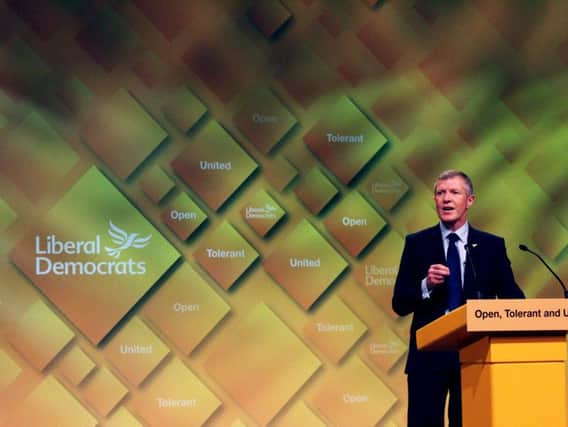Rennie claims Sturgeon has 'very little leverage' on Brexit


The Scottish Liberal Democrat leader said his party would eventually see the benefits as voters come around to the idea of holding another EU referendum to approve the terms of the UK’s Brexit deal, or stay in Europe.
Speaking on the eve of the Richmond Park by-election in London, where he helped campaign on Wednesday, Mr Rennie said Ms Sturgeon had failed to put Theresa May under any pressure over her EU stance.
Advertisement
Hide AdAdvertisement
Hide AdZac Goldsmith, who resigned as a Tory and triggered the by-election over his opposition to a third runway at Heathrow, was struggling to convince voters in south-west London that he was “truly independent”, Mr Rennie added.
Following a YouGov poll for the Times that showed support for independence at its lowest level since 2014, and just 31% backing a second Scottish referendum within the next two years, he claimed the SNP have “very little leverage”.
“They need to put the government under pressure, but what’s the leverage they have got?
“They don’t have the opinion polls behind them saying, yes we want a separate deal for Scotland, they don’t have European governments saying, yes we are behind you. That includes Ireland, who did not say they would go for a separate deal.
“I don’t think Theresa May feels under any pressure whatsoever from the SNP strategy.”
Mr Rennie said he had concerns following the Brexit vote because Ms Sturgeon “looked like the only person who knew what she was doing” but had “overcooked” her strategy over the summer.
“In a little village in northeast Fife on Monday night, a man came to the door, and he said, ‘I voted for independence, but I voted to Leave, and I’m to-ing and fro-ing’. Nicola is just confusing him, and he doesn’t want to vote for independence if it means going right back into Europe again.
“At the heart of the independence campaign, there is a group of people who might not support independence if it means going back into Europe. I’ve met lots of people like that.”
Advertisement
Hide AdAdvertisement
Hide AdAsked how the Lib Dems would compete with the SNP to draw support from pro-EU voters, Mr Rennie said: “The strength of our argument as opposed to theirs is that ours is growing in momentum where theirs is struggling.
“We’ve got competing strategies for keeping us in Europe, but ours is strengthening. I think we’ll start to see benefits of that electorally as people start to realise that the best show in town is the Lib Dem option of a Brexit deal referendum and no blank-cheque Brexit.”
He added: “We can put pressure on [the UK Government] by threatening a Brexit deal referendum, with the large numbers we have in the House of Lords, bringing other parties with us.”
Mr Rennie said the Lib Dem approach of holding a second referendum on the terms of Brexit was drawing support from figures including “John Major, and I hate to say it, Tony Blair” - a reference to reports of talks between former Lib Dem leader Nick Clegg and the ex-Prime Minister on keeping the UK in the EU.
“He still carries a little bit of political weight... I think John Major probably carries more political weight these days than Tony Blair,” the Scottish Lib Dem leader added. “He’s a credible voice.”
Mr Rennie claimed the Lib Dems were the only party that were “pro-UK and pro-Europe” would also benefit from confusion within Labour, which had “compromised” its values on Brexit. “The Labour party have hestitated on Europe and they’ve hestitated on independence,” he said.
Following a report by the Commons Scottish Affairs Select Committee calling for Scotland to get powers over immigration policy, Mr Rennie said he backed measures such as the defunct Fresh Talent scheme that helped attract graduates to fill gaps in specific industries, but not further devolution.
He said any immigration initiative for Scotland “needs to be part of a coherent whole, because it’s all part of one economic policy.
“We wouldn’t argue we should have separate immigration. We’ve got to be very clear about where powers lie, or you end up with confusion.”